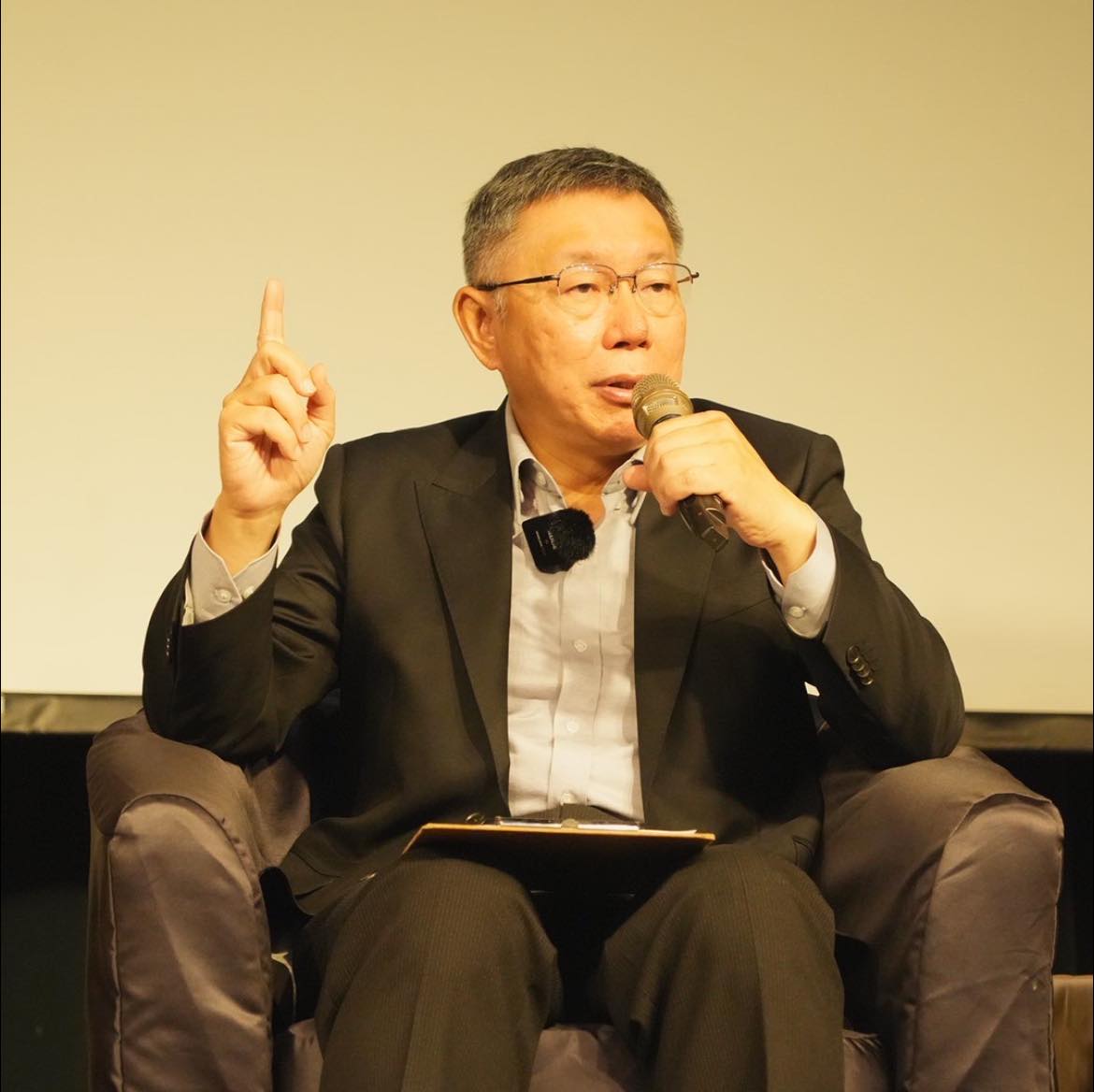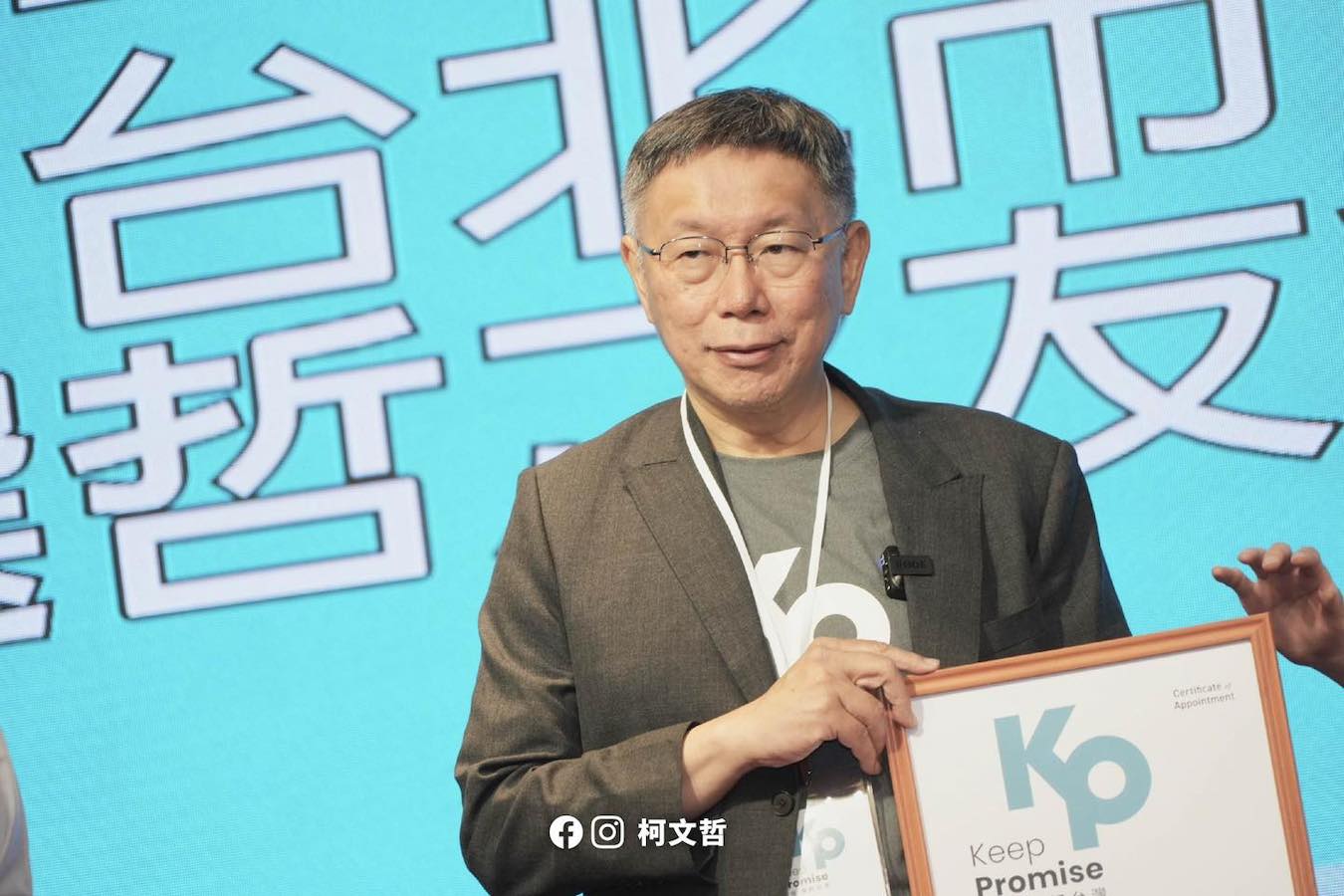by Brian Hioe
語言:
English
Photo Credit: Ko Wen-je/Facebook
FORMER TAIPEI MAYOR Ko Wen-je has continued efforts to shift perceptions of his stance on cross-strait relations in recent days. Namely, Ko seems to be trying to recalibrate his stance on cross-strait relations ahead of the 2024 elections, during which he will be running as the presidential candidate of the TPP. Ko founded the TPP in order to strengthen his standing for a presidential run and he is the party’s chair.
More than any other notable Taiwanese politician of the last decade, Ko stands out for his political turn in shifting from a candidate of the pan-Green camp to the pan-Blue camp. Ko was originally elected as mayor of Taipei in 2014 with the endorsement of the pan-Green camp, running as an independent.
Nevertheless, Ko eventually broke from the pan-Green camp, instead shifting toward a light blue orientation. In particular, Ko became alienated from the DPP after conducting controversial cross-strait exchanges conducted between Taipei and Shanghai, as part of which Ko took to referring to Taiwan and China as “One family on both sides of the straits that share a common destiny.”
 Ko Wen-je. Photo credit: Ko Wen-je/Facebook
Ko Wen-je. Photo credit: Ko Wen-je/Facebook
These exchanges usually took place on a yearly basis and Ko made some version of this statement each time. Tensions between the pan-Green camp and Ko became particularly heated after pro-independence student demonstrators were attacked on the National Taiwan University campus by pro-unification gangsters during an event conducted as part of these exchanges. As such, the DPP did not back Ko in 2018 mayoral elections, and ties have soured since, with Ko launching the TPP in order to compete with both the DPP and KMT.
While the TPP claims itself to be a party that steers clear of both pan-Green and pan-Blue political distinctions, the TPP draws its major politicians from pan-Blue backgrounds. It is generally understood as a light blue party that is not as hardline or right-wing as the KMT, and which has a younger support base. This seems to have worked out to Ko and the TPP’s benefit at present, as some polling shows Ko performing better than the KMT’s candidate, Hou You-yi. That being said, the TPP lacks the national mobilization network or the resources that the KMT does.
As such, Ko seems to be intent on widening his appeal to the broader public. For one, Ko seems to be modulating his cross-strait stance, suggesting that he referred to Taiwan and China as part of the same family to conduct dialogue with China, but that he never accepted the 1992 Consensus.
In comments, Ko claimed that China had not made clear what its definition of the 1992 Consensus is, while suggesting that the KMT had lost the trust of the Taiwanese public, as attested to the Sunflower Movement. Nevertheless, Ko echoed the KMT’s framing of the DPP in arguing that the DPP was pointlessly antagonistic toward China in such a manner that resulted in Chinese threats directed at Taiwan.
Ko later also referred to China as “irrational.” At the same time, Ko did not rule out that the future relationship between Taiwan and China could change in the future, much as Taiwan’s relationship had changed with the US over the course of 30 years.
Indeed, Ko’s comments were made in the context of a trip to Japan, which, too, is likely aimed at presenting a moderate political image for himself. Japan is a possible ally against the military threat from China, after all, even if the KMT has long had a distaste for Japan due to the history of the Sino-Japanese War. During the trip, Ko suggested a willingness to drop the issue of the Diaoyutai/Senkaku Islands, stating that Taiwanese were not particularly interested in the islands, though Taiwan wished to maintain fishing rights there. Although not incorrect, both the KMT–and even the DPP–sought to attack him over the issue, as an affront to the sovereignty of the ROC. Ko’s officer later walked back his comments, stating that he was misquoted.
The significance of Ko’s comments likely lies in that they can be read as a political bellwether for the pan-Blue camp. Ko clearly perceives the need to present himself as politically moderate at present, while the KMT presidential candidate, Hou You-yi, also distinguished himself among other contenders for the KMT presidential nomination through his moderateness on cross-strait issues. In turn, both Ko and Hou will seek to frame William Lai of the DPP as a warmonger and provocateur when it comes to cross-strait relations, while Lai will also seek to emphasize his moderation.
 Photo credit: Ko Wen-je/Facebook
Photo credit: Ko Wen-je/Facebook
Ironically, however, while Ko may be hoping to come off as uncompromising in the face of China, if open to dialogue, and having friendly ties with Japan, Ko has not exactly made his views on Taiwan’s stance with the US very clear. Ko notably tried to claim comments by US scholar Bonnie Glaser about Ko potentially being the candidate in the 2024 election most able to communicate with China indicated that the consensus view in the US was support of him. Later on, when questioned by Glaser criticizing Ko for quoting her out of context, Ko claimed to have never heard of her.
This proved similar to previous incidents in which Ko held confidential meetings with AIT officials and then subsequently stated the contents of these meetings to the media immediately after, again, with the aim of trying to engender the perception that he had the trust of the US. In general. Ko’s attempt to frame Glaser’s comments as indicating support of him or the incident regarding the meetings with AIT suggests that Ko simply sees relations with the US as a way to bolster his domestic political standing.
Moreover, it is to be seen how China reacts to this about-face by Ko. Namely, China itself may prefer candidates who indicate consistent stances in support of closer relations, and it may react with displeasure if the only choices of pan-Blue candidates are Ko and Hou. Indeed, China could actually seek to pressure the two candidates into a harder line, even if this would likely lower their electoral chances, or even try to sabotage their campaigns.

